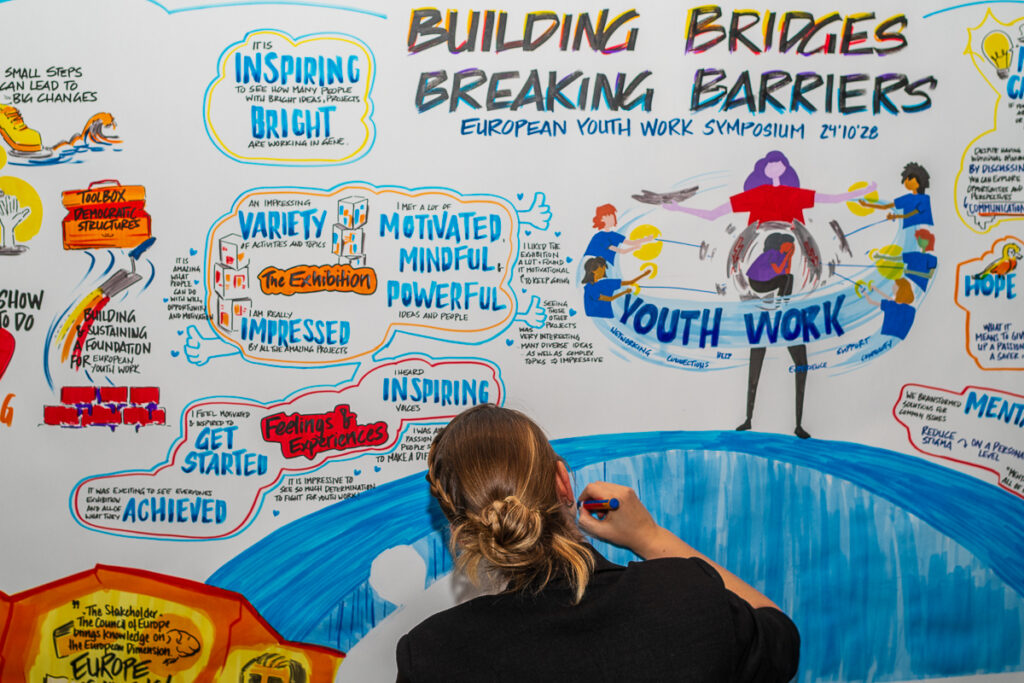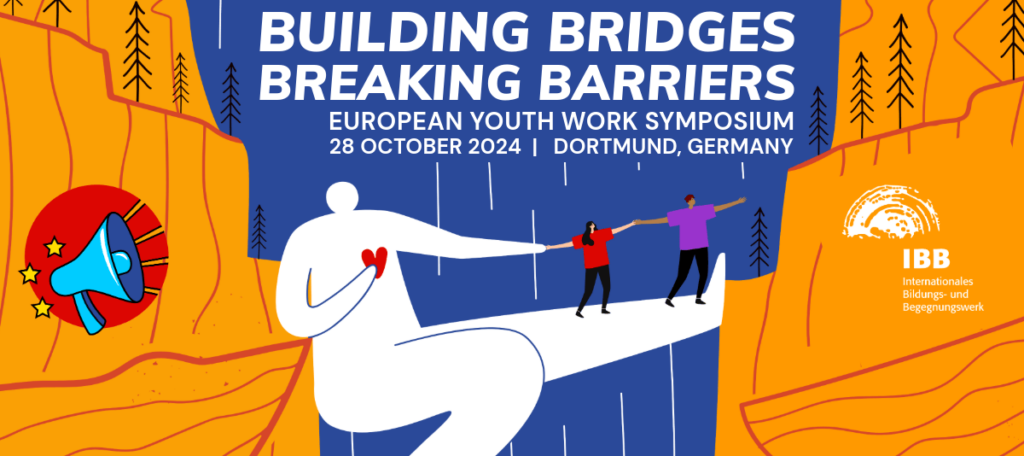
European Youth Work Symposium 2024
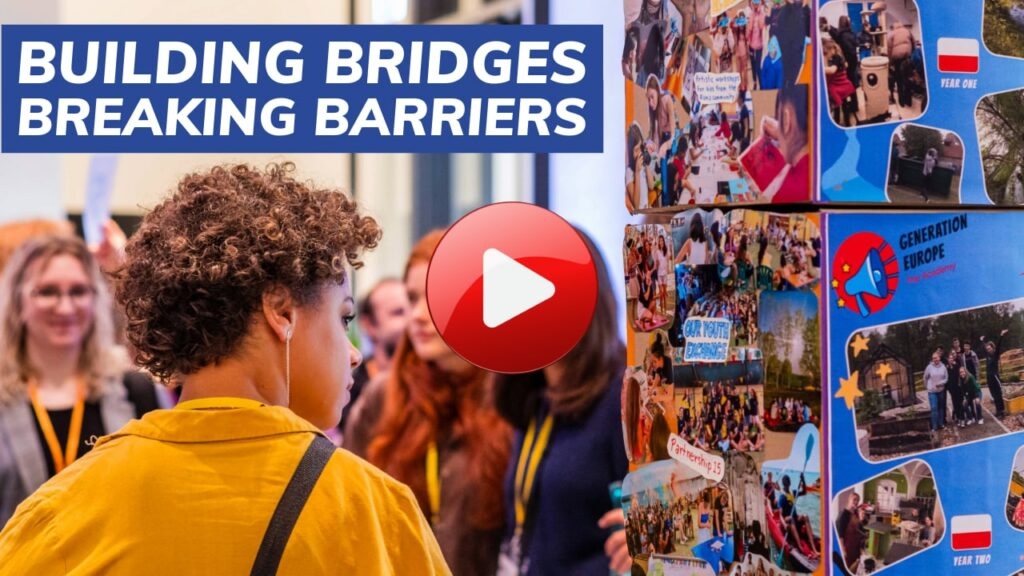
Video: Building Bridges, Breaking Barriers with the European Youth Work Symposium
In many European countries, democracy is under pressure as authoritarian ideas gain strength. This creates serious challenges for young people, who are growing up in a changing and uncertain political landscape. But even in times of multiple crises, they have dreams and concerns they want to address. This makes youth work and participatory youth projects even more important – especially for those who are particularly affected by unequal opportunities.
While the importance of youth work is increasing, the working field itself is confronted with major challenges. Tighter budgets combined with massively rising costs and a lack of sustainable structures make it difficult to fulfil the growing tasks. The European Youth Work Symposium brought together young people, youth work professionals and representatives from politics, administration and academia in a unique format of exchange. We involve everyone who is affected, especially the young people themselves. Our common goal: building bridges and breaking barriers in order to develop solutions to the problems youth work is currently facing.
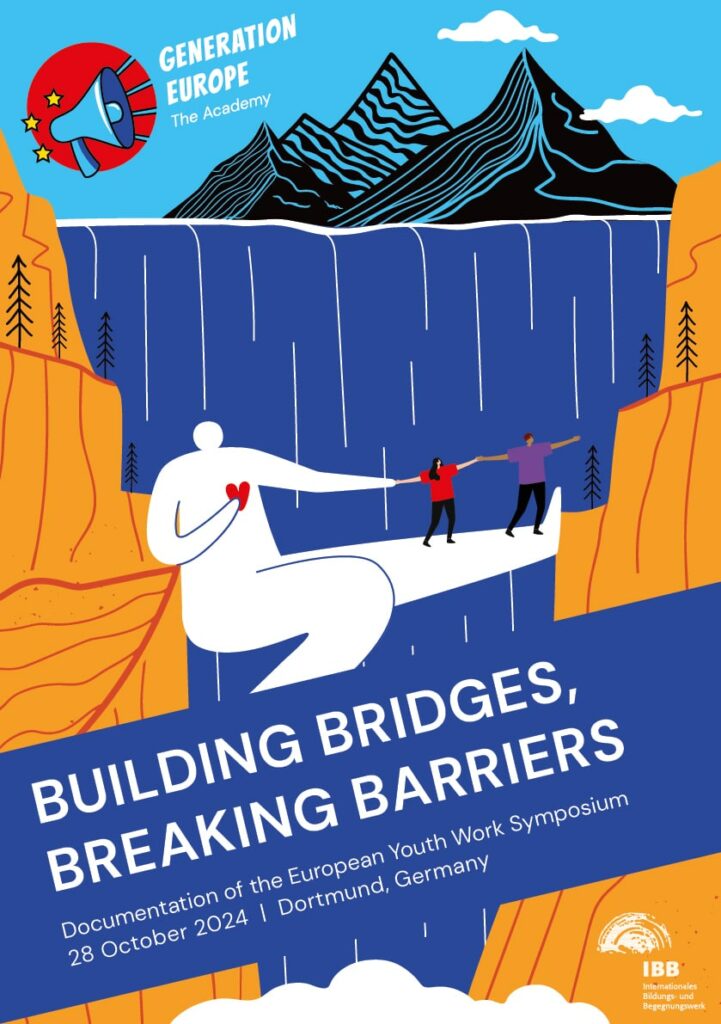
Building Bridges, Breaking Barriers
Documentation of the European Youth Work Symposium, 28 October 2024 in Dortmund, Germany
Published by IBB e.V.
64 pages, 1st edition 2025
- pdf Download| 5,4 MB
- Executive Summary by Gisele Evrard

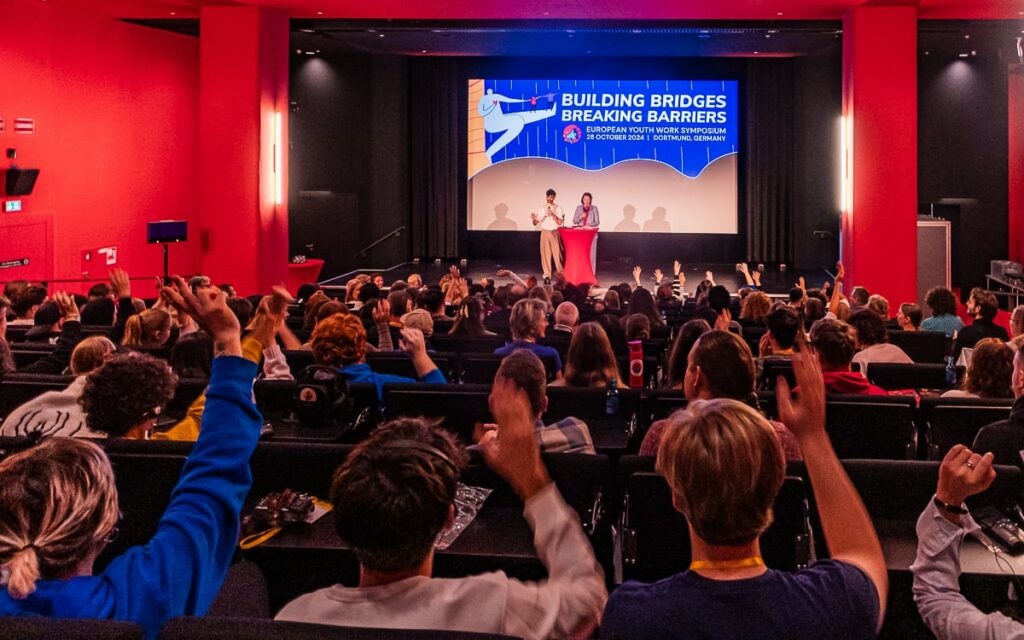
Building Bridges, Breaking Barriers
European Youth Work Symposium 2024
Monday, 28 October 2024
Dortmunder U – Centre for Art and Creativity
Leonie-Reygers-Terrasse, 44137 Dortmund
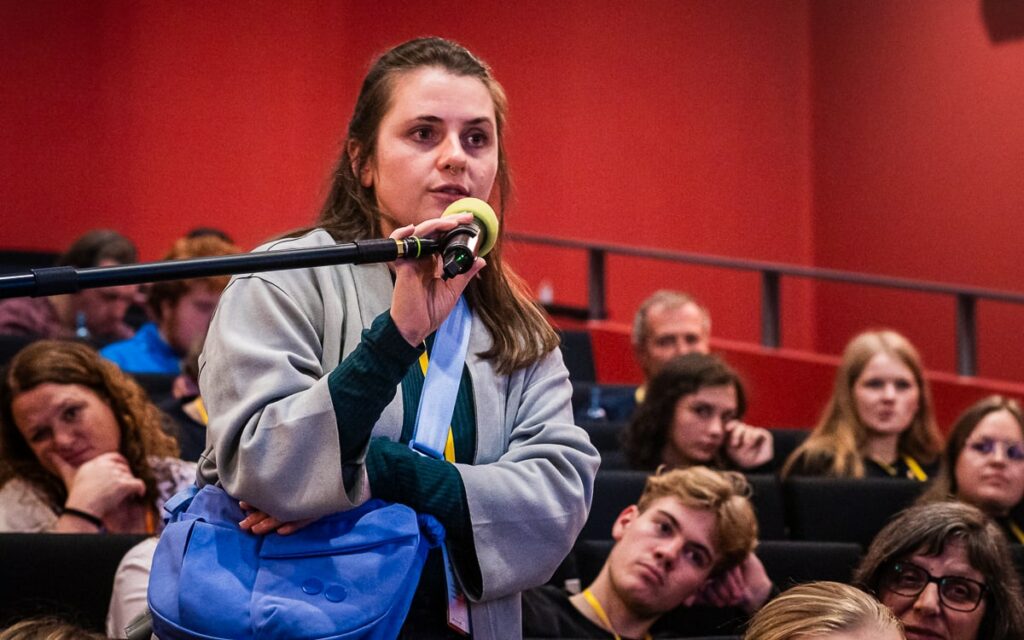
The event was organised by the International Association for Education and Exchange (IBB e.V.) in cooperation with young people and experts from the European youth network “Generation Europe – The Academy”. The Dortmund-based non-governmental organisation has been coordinating networks and funding programmes to enable European youth institutions to work together across national borders for over 15 years now. In addition to international collaboration, strengthening local youth work plays a special part in this.
The European Youth Work Symposium 2024 built on the discussions from the previous event ‘Youth Work in Europe: Mission (Im)possible?’, which took place in November 2023.
Read More About the Event

- Youth Work at its Limit
Better conditions for youth work to preserve democracy in Europe – that is what youth workers from European youth work organisations and young people from 14 countries are calling for. At the European Youth Work Symposium, they met with representatives from academia, politics and administration. The motto of the event: building bridges, breaking barriers. More

- Youth Day ’24: Making Our Voices Heard
Big events cast their shadows ahead: just one day before the European Youth Work Symposium ‘Building Bridges, Breaking Barriers’, young people from twelve European countries and met in Dortmund, Germany. Together, they prepared to present their views on the burning issues in the field of youth work to representatives from administration, politics and academia. More

09:30 Check-In and Admission
10:00 Arrival Talks & Official Welcome: Why we’re here and what we want, with: ■ Jocelyne Jakob (IBB e.V. | Dortmund, Germany), ■ Marit Pelzer (Centre for European Youth Policy at German Youth Institute – DJI | Munich, Germany) ■ Nien Boots (Association Càlam | Barcelona, Spain), ■ Davide Sibilia (Centro di Creazione e Cultura | Florence, Italy)
11:30 Best Practice: Young people present their projects and experiences of European youth work
12:30 Lunch
13:30 Keynote Speech “Building Bridges, Breaking Barriers” by ■ Katia Henrikh, youth worker and project manager from Chernivtsi, Ukraine (DUGA – Deutsch-Ukrainische Gemeinschaft der Jugendarbeit)
14:00 Expert Statements on the focus topics, with: ■ Federica Demicheli (AYWA – Alliance of Youth Workers Associations | Arona, Italy), ■ Karolina Kosowska (Mental Health First Aider | Brussels, Belgium), ■ Philipp Bryant (Protestant University of Applied Sciences Bochum | Bochum, Germany), ■ Judit Balogh (Europe Goes Local | Brussels, Belgium) ■ Maren Mitterer (Fridays for Future & Gemeinsam gegen Rechts | Munich, Germany)
14:30 Working Groups on the five focus topics
16:45 Panel Discussions on the results of the working groups
18:15 Conclusions and Outlook
18:30 Meet & Greet during dinner buffet
20:30 Departure and end of the event
With Working Groups and Expert Statements on the Following Focus Topics:

1. Stronger Together: Organising Youth Workers and Their Allies
Working conditions in youth work are often difficult: temporary and inadequate funding, overlapping professional and voluntary commitments, insufficient recognition of youth work as a profession: How should European youth workers and their allies from politics and civil society network to make their voices heard? Which organisations of cooperation have already been formed, what are their experiences, and what are the next steps to strengthen the representation of common interests? How do these needs relate to the demands of the young people involved?
Facilitated by Olga Kyriakidou, youth worker and trainer for non-formal learning, administration and youth consultancy, Kids in Action (Thessaloniki, Greece) | Input: Federica Demicheli, Board member of AYWA – Alliance of Youth Workers Associations, Vice President of NINFEA – National Informal and Non-Formal Education Association, member of the International Youth Work Trainers Guild (Arona, Italy)

2. Mind Matters: Promoting Young People’s Well-Being in Youth Work
At the beginning of last year, the American Psychiatric Association (APA) declared a mental health crisis among young people. The figures are also clear on this side of the Atlantic: mental health is the most pressing health issue young Europeans are facing. What are the common challenges to the mental well-being of young people and how can resilience in the youth work system be promoted? What support do youth work programmes need in order to be able to respond to these challenges?
Facilitated by Marthe Behr, M.A. Democratic Politics and Communication, B. Sc. Psychologist, project manager and pedagogical staff of Krea-Jugendclub (Bergisch Gladbach, Germany) | Input: Karolina Kosowska, Mental Health First Aider, trainer and facilitator on topics including team building, well-being and stress management (Brussels, Belgium)
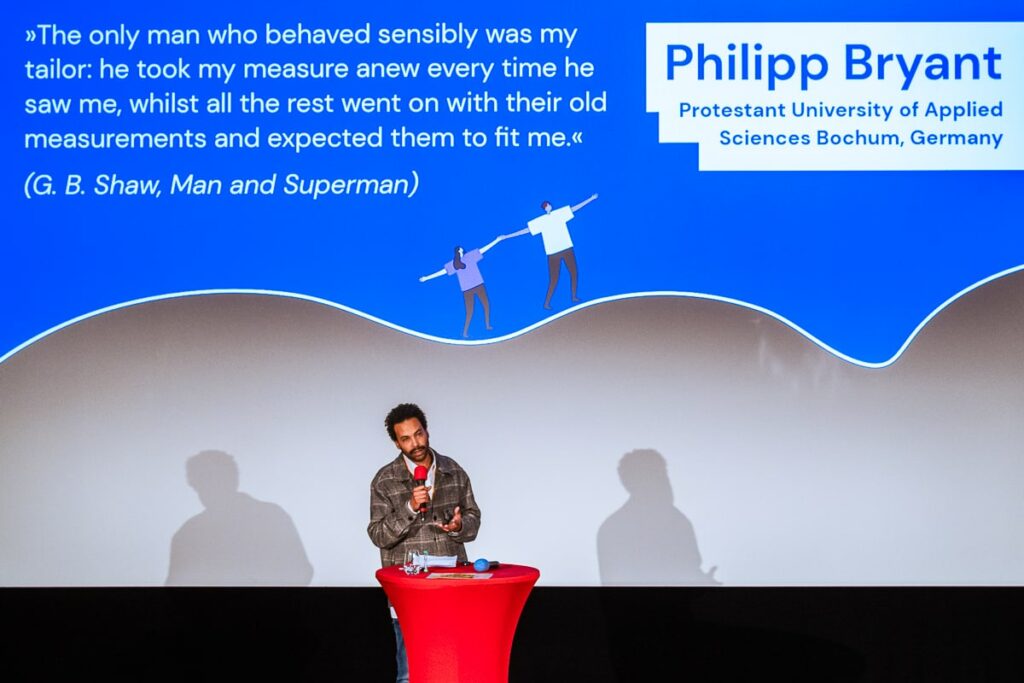
3. Overcoming Barriers: Fostering More Inclusive, Accessible Youth Work
Youth work should be equally accessible to all, regardless of personal constitution, origin, parental income and previous success in the formal education system. Especially when it comes to international programmes, this diversity is not always ensured. How can barriers be recognised and paths be established to make youth work more accessible? What strategies are effective in promoting inclusion and diversity in youth work across different European contexts? How can organisations ensure they are accessible to young people from diverse backgrounds with different needs – and what do the youth work organisations and their staff need to be able to do that?
Facilitated by Amaya Diloy García, Social Educationalist (Dipl.) and Psychopedagogue, Project Manager and pedagogical staff at Fundación Federico Ozanam (Zaragoza, Spain) | Input: Philipp Bryant, special needs pedagogue and lecturer for inclusive pedagogy at the Protestant University of Applied Sciences Bochum (Bochum, Germany)

4. Level Up: Strengthening Local Youth Work for European Cooperation
Impact research largely agrees that international youth projects generate lasting positive effects on young people’s lives and social participation especially when they are integrated into stable local youth work structures. Nevertheless, many funding programmes do not reflect the importance of long-term viable local institutions. What steps need to be taken to secure local youth work as a sustainable basis? On this foundation, how can European cooperation between local youth projects be promoted in order to create new synergies?
Facilitated by Gianni Orsini, youth worker and consultant on sustainable development, international cooperation, conflict management, transformation and participation, Irènia – Jocs de Pau (La Nou de Berguedà, Barcelona, Spain) | Input: Judit Balogh, Coordinator of the European cooperation project Europe Goes Local, JINT vzw (Brussels, Belgium)

5. Active Citizenship and Youth Activism: Two Sides of the Same Coin
Civic education to enable active citizenship is a declared goal of official European youth programmes. At the same time, young people who are committed to social, democratic and ecological issues are sometimes confronted with institutional barriers. The working group offers space for exchange between young activists and representatives from youth work, politics and administration: How can misunderstandings be avoided and actual conflicts of interest be dealt with productively? How can civic education help to prepare young people for these conflicts and contribute to productive solutions? What common goals do active young people and those who decide on the funding and structures of youth work have – and how can we achieve them?
Facilitated by Kasia Blasinska, IRSE – Fundacja Instytut Równowagi Społeczno-Ekonomicznej (Gdańsk, Poland) | Input: Maren Mitterer, Fridays for Future and co-organiser of the demonstration “Gemeinsam gegen Rechts” (Munich, Germany)
